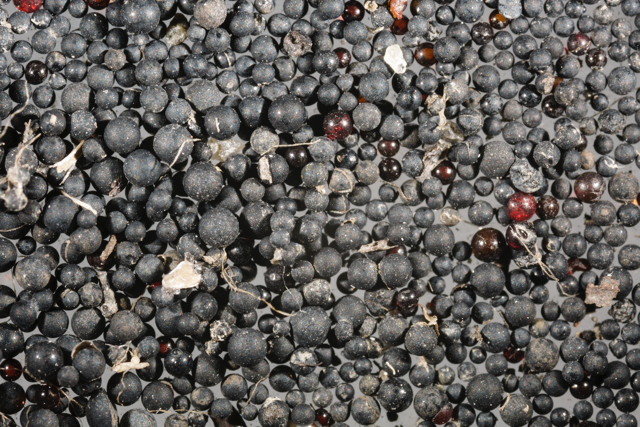
Microbeads collected from St. Lawrence River sediments in Summer 2013. Image: Guy l’Heureux
Researchers have discovered microplastics across the bottom of the St. Lawrence River, the first time these pollutants have been found in freshwater sediment.
Scientists from McGill University and the province of Quebec published their discovery this month in the Canadian Journal of Fisheries and Aquatic Sciences.
The microbeads they found usually come from personal care or cleaning products that wash down the drain and pass through sewage and treatment plants right into bodies of water.
Researchers collected sediment with a steel grabber from ten locations between Lake St. Francis and Quebec City. The microbeads were filtered from the sediment and sorted and counted under a microscope.
“We found them in nearly every grab sample taken,” the lead author of the study, Rowshyra Castañeda, a former McGill student now at the University of Toledo, said in an interview with the National Research Council. “The perfect multi-coloured spheres stood out from natural sediment, even though they were the size of sand grains.”
Although microbeads have long been a global contaminant in oceans around the world, they have only recently been detected in lakes and rivers. Just last summer researchers searched the Great Lakes for microplastics.
The researchers measured more than 264 microbeads per gallon of sediment at some locations, which rivals the world’s most contaminated oceans.
“We were surprised to find such concentrations at the bottom of a river,” McGill professor Anthony Ricciardi, who supervised the study, told the National Research Council. “It was previously assumed that floating microplastics are flushed through rivers to the sea. Now we have evidence that rivers can act as a sink for this pollution.”
While the environmental effects of microplastics are not well known, the surfaces of these plastics attract chemicals that can be transferred to animals that eat them.
With growing recognition of microplastics as a threat to waterways, federal legislation was recently proposed to ban microplastics in personal care products.
Illinois, New York, Minnesota, Ohio and California are considering similar state legislation.
